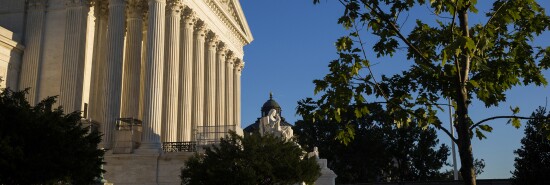
The Supreme Court must stop state courts from hijacking federal elections
Washington Examiner
Video Embed
To hear Democrats like twice-failed presidential candidate Hillary Clinton tell it, democracy will end if North Carolina Speaker of the House Timothy Moore prevails in the case being argued before the Supreme Court today, Moore v. Harper.
“The right-wing Supreme Court may be poised to rule on giving state legislatures — yes, you hear me correctly: state legislatures — the power to overturn presidential elections,” Clinton recently said in a fundraising video for a far-left legal group.
FBI JOINS INVESTIGATION INTO TARGETED ATTACK ON NORTH CAROLINA SUBSTATIONS
If this sounds ridiculous, it’s because Clinton and all the Democrats making this argument are ridiculous. Here are the facts.
In 2021, after receiving the updated census numbers, the North Carolina legislature did what every state legislature does every 10 years: It redrew the state’s federal congressional map. Some far-left activist groups did not like the map created by the legislature (which is controlled by Republicans), so they asked the North Carolina Supreme Court (which was at the time controlled by Democrats) to draw a new map.
Absolutely nothing in the North Carolina Constitution in any way transfers the power to draw congressional maps from the legislature to the courts or any other independent body or to the people via referendum. The Democrats who control the state Supreme Court used just one sentence in the state constitution, “All elections shall be free,” to invent out of thin air a complete and total transfer of power to draw congressional maps from the legislature to the state Supreme Court.
The power of any state to draw congressional maps for a federal election derives from the U.S. Constitution, not from state constitutions. And the elections clause of the Constitution (Article 1, Section 4) clearly states, “The times, places, and manners of holding elections for Senators and Representatives, shall be prescribed in each state by the legislature thereof.”
This does not mean that state legislatures are the only entities with input on federal election rules. The Supreme Court has previously ruled that, since a governor’s veto authority is usually part of a state’s legislative process, a governor can veto congressional maps passed by a legislature. The court has also held that legislatures can vote to transfer their map-drawing power to a third entity (like an independent redistricting committee), much like Congress is allowed to transfer legislative power to executive agencies.
But in this case, there was no act by the legislature that transferred congressional map-drawing power to any other entity. What happened in Moore was a naked power grab by Democrats wearing judicial robes.
To cover up their flagrant seizure of legislative power, Democrats and their allies in the media have spun far-fetched tales about what this case could mean. One involves what they call the “independent state legislature” theory, under which a Republican state legislature could wait until after Election Day to reverse the will of the voters and award a state’s Electoral College votes to the Republican despite the fact that he or she received fewer votes.
This horror story is, of course, a fantasy, and you can tell by its omission of one important fact: the electors clause of the Constitution (Article 2, Section 1), which empowers Congress to set a national Election Day. The will of a state must be determined on Election Day, and no state legislature can rewrite its presidential election rules after that day. Any state legislature that tried to reverse an electoral result after Election Day would immediately lose in federal court, regardless of the outcome of this case.
The Founding Fathers recognized that the closest branch of government to the people was the state legislature. To maximize political accountability, the power to draw federal congressional maps was vested there. The North Carolina Supreme Court is elected, but it is elected for much longer and less politically accountable eight-year terms. A ruling against Moore would constitute a fundamental rejection of the wisdom of the founders on who should set state rules for federal elections.
CLICK HERE TO READ MORE FROM THE WASHINGTON EXAMINER
